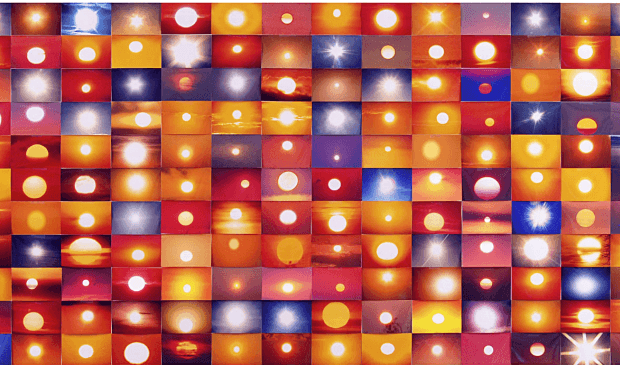Lawsuit seeks to place limits on fair use appropriation of others’ work in art
Detail from Suns (From Sunsets) from Flickr, Penelope Umbrico, 2006-ongoing (Illustration by Penelope Umbrico.)
Artist Richard Prince was sued for copyright infringement last year by photographer Patrick Cariou.
Prince had used dozens of Cariou’s pictures — arty portraits of Rastafarians in Jamaica — in his paintings. This practice of appropriation, incorporating other people’s work into new artworks, is well established in the art world, and Prince has made a successful career on it.
But a federal judge ruled for Cariou last year, and if Prince loses his appeal, a swath of contemporary art making will become illegal.
Attorney Michael Rips represented Jeff Koons in a very similar case in the 1990s. Koons had used a cute tourist postcard — a couple holding puppies — to create a multimillion-dollar sculpture. These cases aren’t easy to argue, Rips said.
“At the end of the day, however much you appropriate — whatever you’re commenting on — before you can have a copyright violation you have to show damages. You have to show that the person from whom you borrowed has been economically injured,” Rips explained.
Rips thinks the markets in which Cariou and Prince sell their work are quite distinct, so he isn’t convinced Cariou experienced injury.
Artist Penelope Umbrico appropriates images from the internet for much of her work. In her series called Suns (From Sunsets) from Flickr she used (without permission) bits of hundreds of amateur photographs. Umbrico contends that because her work is fragmentary and the original image so ubiquitous, it doesn’t make sense “to ascribe an individual authorship in the original photograph.”
And while Prince’s appropriation of Cariou’s Rastafarians may be more obvious, she defends his use of the photos.
“Prince is using that as an aesthetic device in his work. He is not interested in authoring images, he’s interested in making paintings and employing images to be active inside the frame of his paintings,” Umbrico said.
If Prince loses the appeal, appropriation art like Umbrico’s will be on shakier ground legally. But she insists she won’t change her method.
“It’ll make me more adamant about working this way,” she said.
(Left) Photograph by Patrick Cariou from his 2000 bookYes Rasta, (right) painting from Richard Prince’s 2008 “Canal Zone” series (powerHouse Books, Gagosian Gallery)
The introduction of a previous version of this article incorrectly identified who filed the lawsuit.
